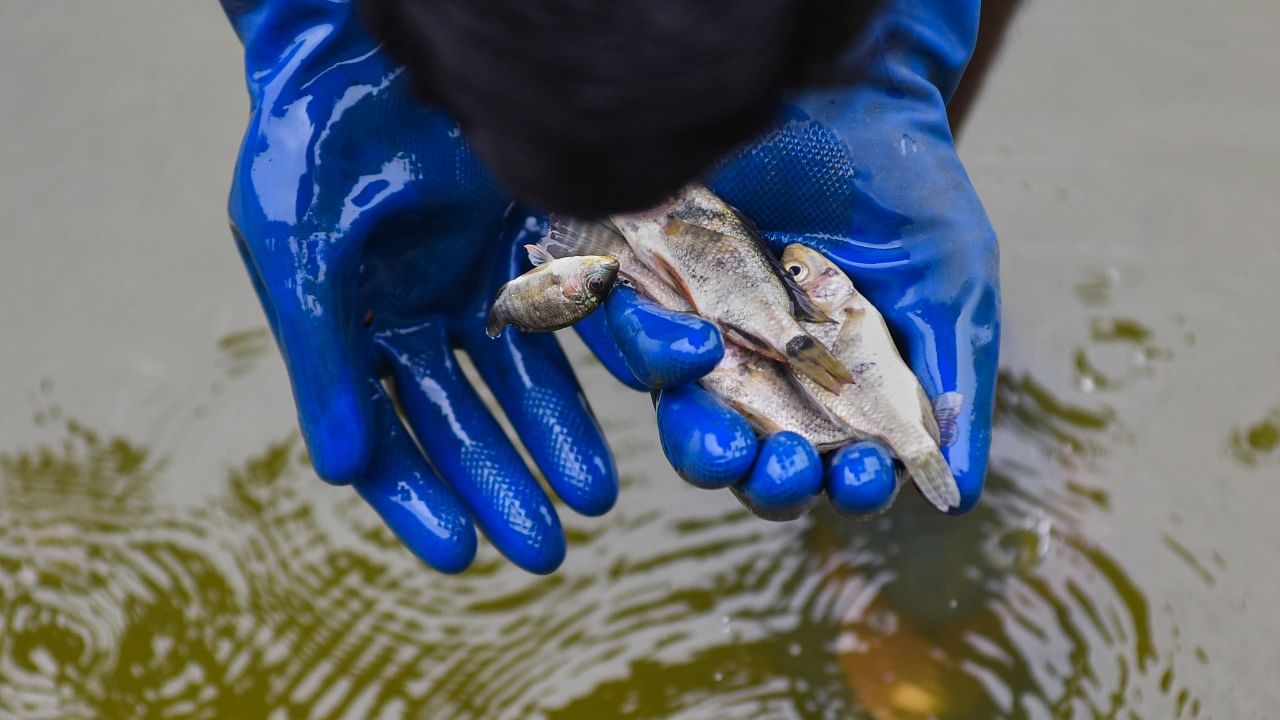
Floating dead fish has been reported in five Bengaluru lakes over the past month, raising concerns over worsening pollution levels in water bodies.
Among the lakes where the phenomena were observed include waterbodies in Yelachenahalli, Haralur, Mahadevapura, and Kothanur.
Experts pointed to the release of sewage into the lakes as a major reason for fish dying in large numbers, while industrial effluence and the absence of scientific management have also exacerbated the pollution.
However, the Bruhat Bengaluru Mahanagara Palike (BBMP), which maintains most of the city lakes, is unable to stop the pollution choking the fish population, which is happening far too regularly. Senior municipal officials blamed the recent rains for the fish deaths.
“We have constructed diversion channels and are making efforts to prevent sewage entry into the lakes. However, during heavy rain, more pollutants are washed off into the lake, resulting in such incidents. We will have to consult experts and come up with an action plan to avoid such incidents in the future,” said Vijayakumar Haridas, BBMP Chief Engineer (Lakes).
Blame it on rain
Lake activists doubt if rain can be the only reason for fish deaths. “This can’t happen when sewage enters the lake once due to a spell of rains,” said Raghavendra B Pacchapur, programme manager, ActionAid Association India.
“It is a long-term phenomenon, where constant pollution results in the growth of algal bloom, which blocks sunlight and reduces oxygen levels. For instance, in Haralur Lake, sewage was seen entering from December and fish kill was reported just a few days ago,” Raghavendra added.
Experts said a large number of fish deaths indicate an alarming dip in water quality that should stir officials from their slumber.
Environmentalist Yellappa Reddy A N said fish deaths occur when dissolved oxygen levels in water drop below 4 mg per litre.
“This could be the result of effluents being discharged into the lake for a long time. We alerted authorities to the practice of industries dumping waste into stormwater drains. But none of them took action. Each agency shifts blame to another,” Reddy added.
Ram Prasad, co-founder of Friends of Lakes, urged agencies for better coordination.
“The Karnataka State Pollution Control Board (KSPCB) should monitor the water quality. Also, the BBMP, KSPCB, BWSSB, and fisheries department should hold regular coordination meetings that will help them manage the lakes better,” he said.
KSPCB officials asserted that they regularly monitor water quality.
“Most of the lakes in the city are either in category E or category D, which indicates a high level of pollution. We are assessing the quality regularly and bringing it to the notice of the lake owners,” a senior KSPCB official said, adding that improving water quality to prevent fish deaths can be achieved only in the long term.
“We are also increasing the capacity of the sewage treatment plants near the lakes. We will need some time to see results on the ground,” the official added.